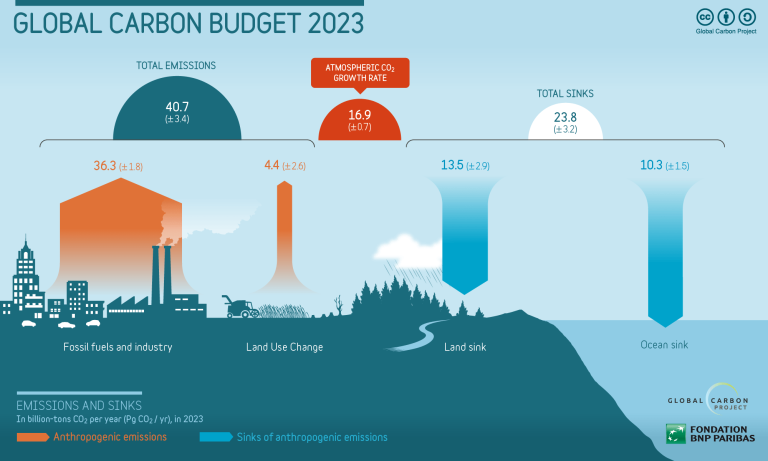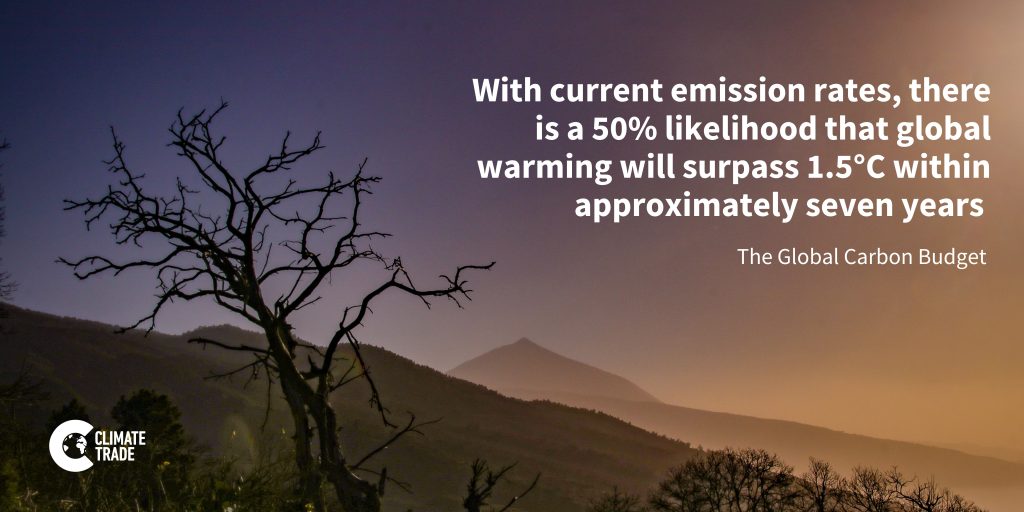The annual Global Carbon Budget reported a 1.1% increase in fossil fuels, carbon dioxide (CO2) emissions, reaching 36.8 billion tonnes in 2023 compared to the previous year, 2022.
In 2023, global carbon emissions from fossil fuels have once again surged to unprecedented levels, marking a troubling escalation, as revealed by the latest findings from the research team at the Global Carbon Project. Despite witnessing a decline in fossil CO2 emissions in specific regions, the overall trajectory remains upward.
The scientists emphasize that the pace of global efforts to curtail the use of fossil fuels is insufficient to avert the impending threat of hazardous climate change. While emissions from land-use changes, including deforestation, are anticipated to see a marginal reduction, they still exceed the mitigating effects of current reforestation and afforestation endeavors. The report forecasts that the total global CO2 emissions (combining fossil and land-use changes) will reach 40.9 billion tonnes in 2023, mirroring the levels observed in 2022. This stagnation forms part of a concerning 10-year “plateau,” highlighting the substantial gap from the decisive emissions reduction necessary to meet critical global climate targets.

The comprehensive research team involved institutions worldwide, including the University of Exeter, the University of East Anglia (UEA), CICERO Center for International Climate Research, Ludwig-Maximilian-University Munich, and 90 other collaborating institutions.
How much time remains until we surpass global warming of 1.5°C?
With current emission rates, the Global Carbon Budget team projects a 50% likelihood that global warming will consistently surpass 1.5°C within approximately seven years.
The annually updated Global Carbon Project report, crafted by an international consortium of over 120 scientists, stands as a peer-reviewed document that builds upon established methodologies in a fully transparent manner. In addition to this crucial projection, the 2023 Global Carbon Budget presents other key findings:
Regional trends vary dramatically. Emissions are projected to increase in India (8.2%) and China (4.0%), and decline in the EU (-7.4%), the USA (-3.0%) and the rest of the world (-0.4%).
Global emissions from coal (1.1%), oil (1.5%) and gas (0.5%) are all projected to increase.
Atmospheric CO2 levels are projected to average 419.3 parts per million in 2023, 51% above pre-industrial levels.
About half of all CO2 emitted continues to be absorbed by land and ocean “sinks,” with the rest remaining in the atmosphere where it causes climate change.
Global CO2 emissions from fires in 2023 have been larger than the average (based on satellite records since 2003) due to an extreme wildfire season in Canada, where emissions were six to eight times higher than average.
Current levels of technology-based Carbon Dioxide Removal (ie excluding nature-based means such as reforestation) amount to about 0.01 million tonnes CO2, more than a million times smaller than current fossil CO2 emissions.

Clarifying Climate Goals & Addressing Fossil Fuel Ambiguities
At COP28 nearly 200 U.N. climate summit diplomats approved a global pact, explicitly advocating for a transition away from fossil fuels. This landmark agreement, reached amid the hottest recorded year, marks the culmination of decades of climate science highlighting dangerous warming caused by oil, gas, and coal combustion. Despite the clear consensus, the 28th summit succeeded where its predecessors failed, making the inclusion of “fossil fuels” in the pact a potentially game-changing moment.
The deal specifically urges countries to expedite the global shift away from fossil fuels within this decade, aiming to cease carbon dioxide emissions by midcentury. Additionally, nations are called upon to triple the deployment of renewable energy systems worldwide by 2030.
Climate experts have however expressed disapproval of the use of ambiguous language, deeming it a ‘tragedy for the planet and our future.’ The more assertive term “phase-out” received support from 130 out of the 198 countries engaged in negotiations in Dubai but faced resistance from petrostates such as Saudi Arabia.
How Does the Private Sector Feel About Transitioning Away from Fossil Fuels?
Historically the private sector has appeared to operate in silo and kept quiet when it comes to energy sources. In preparation for COP28 however, a coalition of over 200 companies, collectively representing more than $1.5 trillion in global annual revenue, urged national governments to address the leading cause of climate change – fossil fuels.
This letter was coordinated by We Mean Business Coalition and its partners through the Fossil to Clean campaign. The campaign called for decisive action from national governments, advocating for specific measures such as phase out targets, energy transition targets as well as clear carbon pricing and subsidy reform.
How can the Private Sector Support Green Energy Projects?
The ClimateTrade Marketplace empowers organizations to engage in direct climate action and contribute to the funding of green energy projects globally. Businesses demonstrating support for green energy projects through the ClimateTrade Marketplace are actively contributing to a more sustainable and resilient future, marking a powerful commitment to combating climate change and accelerating the transition towards cleaner and more innovative energy solutions.








